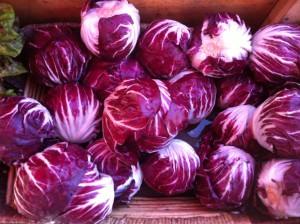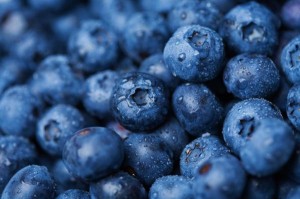Brown is the New Red
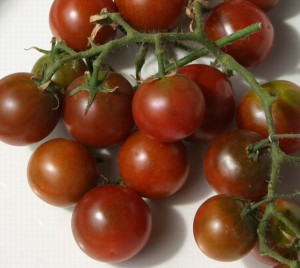 One of the July menus in the Year of Recipes from the Garrison Institute Kitchen calls for brown cherry tomatoes, which at first I thought was a typo and what they really meant was: browned cherry tomatoes. But I was wrong. It seems there’s a “new” heirloom variety of tomatoes, which they grow at the Garrison Institute gardens.
One of the July menus in the Year of Recipes from the Garrison Institute Kitchen calls for brown cherry tomatoes, which at first I thought was a typo and what they really meant was: browned cherry tomatoes. But I was wrong. It seems there’s a “new” heirloom variety of tomatoes, which they grow at the Garrison Institute gardens.
So of course I thought I would never encounter them. But I was wrong again. Whole Foods had a whole table of them! (These were grown in a greenhouse and shipped from Canada, so they probably don’t taste like the ones picked from the gardens at the Garrison Institute, but I figured I’d give them a try anyway.) I tasted one right out of the package with a little sea salt and it was pretty good. Quite tart. Meaty. With a firm skin.
Here’s the recipe, which I plan to make tonight:
Pasta with Brown Cherry Tomatoes, Eggplant, Salt-Cured Capers, Mozzarella, Mint, Basil, and Garlic
1/2 lb. high-quality penne pasta, cooked according to package
1 cup brown cherry tomatoes (or your favorite variety)
1/2 lb. fresh mozzarella, cut into 1-inch cubes (room temperature)
1/2 cup olive oil, divided
1/4 cup coarsely chopped mint
1/4 coarsely chopped basil
1 1/2 tsp. chopped garlic
1 1/2 tsp. salt-cured capers, soaked for a few minutes in water (I’m going to have to use water-packed capers. Outside of Italy, or a real Italian grocery store…like on the Hill in St. Louis…I’ve never been able to find capers packed in salt.)
Salt & black pepper
1 1/2 cups eggplant, cut into 1-inch cubes, skin on or off
1.Preheat oven to 400 F. Cut the cherry tomatoes in half, or quarter them, depending on the size, and place in a serving bowl.
2. Add the fresh mozzarella to the tomatoes in the bowl along with 1/4 cup olive oil, mint, basil, garlic, drained capers, and a pinch of salt and pepper. Let the mixture stand to allow the flavors to blend while roasting the eggplant.
3. In another mixing bowl, toss the eggplant with the remaining 1/4 cup olive oil and pinch of salt. Roast on a baking sheet until golden brown and completely tender, about 10 to 12 minutes. (Underdone eggplant is spongy and bland, yet bitter, while well-cooked eggplant is silky in texture with a more developed, sweeter taste.) Keep in a warm spot on the stovetop.
4. Add the just-cooked, al dente pasta and hot eggplant to the bowl with the tomato mixture. Toss together. Taste and adjust the salt and pepper. Serve warm.
The original recipe serves 4 to 6. I’m by myself, so I’ve halved the ingredients. I figure this should make enough for 2 dinners.
The Usefulness of What Isn’t
 Today’s post from Ursala Le Guin’s wonderful new translation of the Tao Te Ching.
Today’s post from Ursala Le Guin’s wonderful new translation of the Tao Te Ching.
11. The Uses of Not
Thirty spokes
meet in the hub.
Where the wheel isn’t
is where it’s useful.
Hollowed out,
clay makes a pot.
Where the pot’s not
is where it’s useful.
Cut doors and windows
to make a room.
Where the room isn’t,
there’s room for you.
So the profit in what is
is in the use of what isn’t.
Breathe Air. Drink Water.
 I’m almost to the end of Ursala Le Guin’s wonderful novel/imaginary-anthropology-report/love-letter-from-the-future, titled Always Coming Home, and I’m reluctant to move on.
I’m almost to the end of Ursala Le Guin’s wonderful novel/imaginary-anthropology-report/love-letter-from-the-future, titled Always Coming Home, and I’m reluctant to move on.
So I’ll post this little snippet, a poem called The Writer to the Morning in Up The Hill House in Sinshan, by Little Bear Woman (one of the residents of Le Guin’s inspiring future/past world.)
Those who want fighting, let them smoke tobacco.
Those who want excitement, let them drink brandy.
Those who want withdrawal, let them smoke cannabis.
Those who want good talking, let them drink wine.
I don’t want any of those things at this moment.
Early in the morning I breathe air and drink water,
because what I want is clarity and silence
and one thin line of words on the white paper
drawn around my thoughts in clarity and silence.
Red & White, and Blue
It’s the 4th of July, in celebration of which I offer this recipe from Fresh Cooking: A Year of Recipes from the Garrison Institute Kitchen.
Radicchio and Blueberries with Sherry Vinegar and Walnut Oil
2 to 4 heads radicchio
1 pint blueberries
3 to 4 Tbsp. toasted walnut oil (or substitute olive or hazelnut oil)
2 to 3 Tbsp. sherry vinegar (or use your favorite!)
1 Tbsp. Dijon mustard (optional)
1 clove garlic, crushed (optional)
Salt and black pepper
Tear or shred the radicchio, toss with the blueberries, oil, vinegar, mustard, garlic, salt and pepper, and serve!
When Does the Journey Begin?
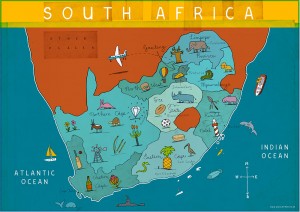 I’ve taken the first step toward going by sending an email to Dharmagiri (the Hermitage in South Africa that I posted about here), saying I’d like to register for the month-long retreat next January.
I’ve taken the first step toward going by sending an email to Dharmagiri (the Hermitage in South Africa that I posted about here), saying I’d like to register for the month-long retreat next January.
So have I started the journey?
Maybe it started earlier, when I first thought that going on a retreat in South African might be something I’d want to do. Or maybe earlier than that, when I first heard the dharma talk by Kittisaro and Thanissara, where they mentioned that they hold an annual retreat at their Hermitage and inviting people to come.
Or maybe even earlier than that, when I decided to retire so I could go to Burma and to IMS to sit a long retreat. Or maybe when I went on that first retreat, for employees of Monsanto (!), back in 1998. Or in 1970, when I was in college and read Siddhartha and didn’t understand it, but felt like there was something really important there for me, I just didn’t know what. Or maybe even earlier than that. Maybe before I even was born!
Who knows. Everything depends on everything else, so how can you really say when something starts. Or when it ends, for that matter.
All I can say is that right now, at this moment, I am planning to go to South Africa in January!
Seeing Is Remembering
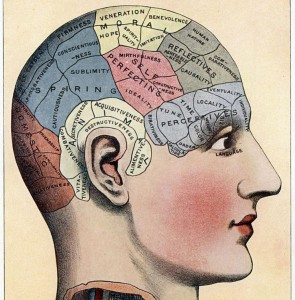 This from Dawn Light: Dancing with Cranes and Other Ways to Start the Day, by Diane Ackerman, another serendipitous find from the stacks of the Chapel Hill Public Library:
This from Dawn Light: Dancing with Cranes and Other Ways to Start the Day, by Diane Ackerman, another serendipitous find from the stacks of the Chapel Hill Public Library:
“Brain-mapping shows that two-thirds of vision is memory, not what’s happening in the occipital lobes! When I see a magnolia branch, my brain provides an image of the full tree, when I hear a rat-a-tat-tat, my brain riffles through its images for a woodpecker viewed one morning last fall.
“Memories are always true to the moment of recall. Each time we haul them up from the brain’s sloshy attic, we primp and prune them in terms of the here and now, and store them as slightly different mementos.
“As we grow and change, each memory adapts so that we feel real and fuel a continuous sense of self. And so every generation experiences a unique version of history, and everyone revises memories over time.”
What’s Your Name?
 I’m fascinated by the fictional society Ursala Le Guin has created in Always Coming Home. Especially the names of the characters, and the way they get them.
I’m fascinated by the fictional society Ursala Le Guin has created in Always Coming Home. Especially the names of the characters, and the way they get them.
The characters in the book have a First name, a Middle name, and a Last name. But it’s not like our names, which we get all at once when we’re born. They get a name when they’re born, which is their First name. And then they get a Middle name later, when they’re in the middle of life…when they become an adult or when they’ve established themselves in some kind of identity. And then in the last part of their life, they get a Last name.
Their families give them their First name. This is not a city culture, so their names are usually taken from nature. The narrator’s Fist name is North Owl. Thorn is another example. Or Agate.
Their Middle name comes from something about their habits or character, or an important event in their life. It can be given by a family member, or by an important teacher, or it can be a name that they choose for themselves. The narrator’s Middle name is Woman Born Above Others. Ewe Dance in another example. Or Willow. Or Ire.
I haven’t gotten to the end of the book, so I’m not exactly sure, but the Last name seems to be the most personal. It’s usually a name one declares for oneself, but it can also be given. It can come from a vision. Or a vocation. Or from a great change of life. The narrator’s Last name is Stone Telling. Old Cave Woman is another example. Or Mouse Dance. Or Corruption.
I’m past the middle part of my life, so if I were to get a new name, it would be my Last. I wonder what it would be.
Something to do with Inspiration and Imagination and Enjoyment, I hope. Solitude would probably be a part of it. Maybe something like Reads A Lot.
🙂
Random Treasure
 I was at the magnificent Chapel Hill Public Library over the weekend, looking for a poem I had heard quoted on a recent dharma talk, when I was drawn to a little red spine, on a completely unrelated shelf. It read: Things That Are. I stopped and opened it up.
I was at the magnificent Chapel Hill Public Library over the weekend, looking for a poem I had heard quoted on a recent dharma talk, when I was drawn to a little red spine, on a completely unrelated shelf. It read: Things That Are. I stopped and opened it up.
It was a little gem! A collection of essays by Amy Leach, her first book, and it starts like this:
“Usually all we have to do when we go a-conquering is build a boat, find a benefactress, recruit a ribald crew, and wear glinting helmets.”
I love that! It continues:
“….Even with our fine record of conquest, there remain a few things we do not have atlases for, like tomorrow and the rain and the gods and donkeys. This is the sweet stuff of gambling–the chancier the better.
“Betting on wild donkeys at the Kentucky Derby is even more fun than betting on thoroughbreds: with wild donkeys from the salt flats there are no tired conventions like ‘early moderate tempo’ or ‘tactical speed’ or even ‘forward progress.’ A donkey derby is nothing but upsets, from start to finish. And betting on the gods is better still; it feels like placing bets on Thelonious Monk’s ten fingers–which finger will play what key next!
“Tonight, on this latest antecedent of tomorrow, it is starry out and I am not in a conquering mood. Come and miss the boat with me. Come and play some guessing games. We’ll read aloud the illegible electric green script of the northern lights; we’ll speculate about which star in the next ten thousand years is going to go supernova. Then we’ll listen to a recording of ‘Epistropy.’ I’ll wager on his left thumb, you take whichever finger you want, and with the mad currency we collect from each other I’ll buy you rain, you buy me snow, and we’ll go in together for sunshine for the grass and the clover and the delicious prickly thistles.”
***
How happy I am to have set out toward my destination and to have arrived at yet another.
New Moon, New Mind
 There is a new moon today, so I think I’ll try something new.
There is a new moon today, so I think I’ll try something new.
One of the recent events at Spirit Rock was a daylong retreat titled: The Great Mother and the Nature of Mind. It was led by a highly respected teacher in the Tibetan tradition, Lama Tsultrim Allione, who just happens to be a Western woman!
A video recording of the event is available to members of the Spirit Rock Stewardship Circle (which includes me) and since I know almost nothing about Tibetan teachings or practices, this would certainly qualify as something new.
There’s a handout included with the video. It’s an excerpt from The Concise Life Story of Machig Labdron. I have no idea who Machig Ladron is, although I’m guessing that maybe she’s the Great Mother, in the title of the retreat.
Here’s what the handout says:
Machig’s Last Instructions
In the same way, mind itself,
Has no support, has no object:
Let it rest in its natural expanse without any fabrication.
When the bonds of negative thoughts are released,
You will be free, there is no doubt.
As when gazing into space,
All other visual objects disappear,
So it is for the mind itself.
When mind looks at mind,
All discursive thoughts cease
And enlightenment is attained.
As in the sky all clouds
Disappear into the sky itself:
Wherever they go, they go nowhere
Wherever they are, they are nowhere.
This is the same for thoughts in the mind:
When mind looks at mind,
The waves of conceptual thought disappear.
The defining characteristic of mind
Is to be primordially empty like space;
The realization of the nature of mind
Includes all phenomena without exception.
Once discursive thoughts are totally abandoned,
Dharmakaya is no other than that.
Once the five poisons are totally abandoned,
The five wisdoms are none other than that.
Abandoning all bodily activities,
Remain like a bunch of straw cut loose.
Abandoning all expressions of speech,
Remain like a lute with its strings cut through.
***
The last part doesn’t sound all that great. But who knows, maybe it’s a cultural thing. I’ll watch the video and find out!
Ripen as Beauty and Pleasure
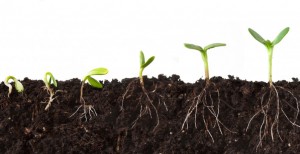 Last night I sat up reading Verses from the Center, Stephen Batchelor’s lovely translation of the ancient Sanskrit text by Nagarjuna who, according to Batchelor, “is arguably the most important figure in Buddhism after the Buddha himself.”
Last night I sat up reading Verses from the Center, Stephen Batchelor’s lovely translation of the ancient Sanskrit text by Nagarjuna who, according to Batchelor, “is arguably the most important figure in Buddhism after the Buddha himself.”
Here’s a sample:
Seeds turn into plants that bear fruit.
Motives turn into minds that bear fruit.
Seeds are neither severed from
Nor forever fused with fruits of plants,
Motives neither severed from
Nor forever fixed with fruits of minds.
No killing and no stealing,
No abusing and no lying,
No slandering, swearing, gossiping,
No coveting, resenting or fixating:
These pristine acts
Are ways to practice
That ripen as beauty and pleasure
Here and elsewhere.

